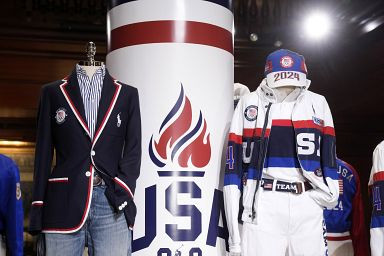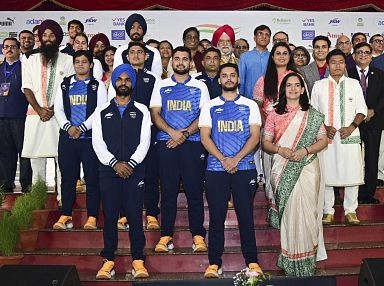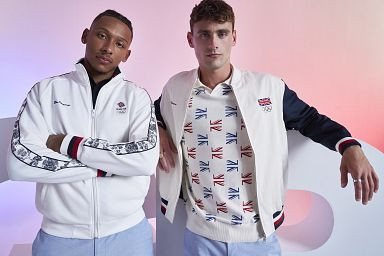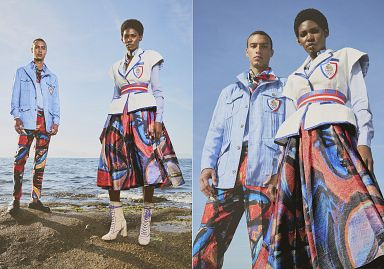Olympic uniforms are often in English to ensure broad communication and recognition. At onlineuniforms.net, we understand the importance of clear communication in a global event, and our uniform solutions cater to diverse needs. Discover how the use of English in Olympic uniforms enhances visibility and promotes a unified message.
1. What Role Does Language Play in Olympic Uniform Design?
Language in Olympic uniform design plays a crucial role in communicating national identity, team unity, and sponsor recognition. The choice of language impacts global understanding and visibility, which is why English is frequently used.
1.1. The Importance of Language Choice
Choosing a language for Olympic uniforms involves considering the global audience and the message the team wants to convey. English, as a widely spoken language, often bridges communication gaps.
1.1.1. Global Communication
Using English on uniforms ensures that a broad international audience can understand the messaging and branding. This is particularly important for sponsors and team identity.
1.1.2. National Identity
While national colors and symbols are prominent, incorporating English can make the uniform more accessible to international viewers and media.
1.2. How English Facilitates Global Understanding
English is a dominant language in international sports, media, and commerce. Its use on uniforms helps facilitate understanding and recognition across different countries and cultures.
1.2.1. Media Coverage
Most international media outlets use English in their broadcasts and publications. Uniforms featuring English are easily understood and reported on by these media outlets.
1.2.2. Sponsor Visibility
Many Olympic teams have international sponsors. Using English on uniforms helps these sponsors gain maximum visibility and recognition.
 Team USA Paris Olympics opening ceremony attire, displayed at Ralph Lauren headquarters on Monday, 17 June 2024, in New York.
Team USA Paris Olympics opening ceremony attire, displayed at Ralph Lauren headquarters on Monday, 17 June 2024, in New York.
Team USA showcases their Olympic opening ceremony attire at Ralph Lauren headquarters, emphasizing the global appeal of English-language branding on uniforms.
2. Why Is English a Common Choice for Olympic Uniforms?
English is a common choice for Olympic uniforms due to its widespread use in international communication, media, and commerce. This ensures broader recognition and understanding.
2.1. The Prevalence of English in International Communication
English serves as a lingua franca in many international settings, making it a practical choice for Olympic uniforms to reach a global audience.
2.1.1. Lingua Franca
As a lingua franca, English facilitates communication between people who speak different native languages. This is crucial in the diverse environment of the Olympics.
2.1.2. Business and Trade
Many multinational corporations and international organizations use English as their primary language, increasing its relevance on a global scale.
2.2. The Impact of Media and Broadcasting
English is the primary language of many major media outlets, ensuring that uniforms featuring English are easily understood and reported on by international media.
2.2.1. Major Media Outlets
Outlets such as CNN, BBC, and Reuters use English, ensuring wide coverage of the Olympics and its participants.
2.2.2. Broadcasting Standards
English is frequently used in international broadcasting standards, making it a logical choice for uniform designs.
2.3. Historical and Cultural Factors
The historical influence of the British Empire and the cultural impact of American media have contributed to the widespread adoption of English as a global language.
2.3.1. British Empire
The historical reach of the British Empire spread the English language to many parts of the world.
2.3.2. American Influence
The dominance of American media and entertainment further solidified English as a key language in global culture.
3. What Design Elements Are Typically Included in Olympic Uniforms?
Olympic uniforms typically include national colors, symbols, and English text for team names and sponsor logos. These elements combine to create a cohesive and recognizable design.
3.1. National Colors and Symbols
National colors and symbols are essential for representing a country’s identity and pride in the Olympic Games.
3.1.1. Color Psychology
Colors evoke emotions and associations, making them powerful tools for representing national identity.
3.1.2. Symbolic Representation
National symbols, such as flags, emblems, and iconic imagery, reinforce a country’s heritage and values.
 Indian athletes posing with officials as they model India's ceremonial and playing uniforms for the Paris Olympics in New Delhi, India, 30 June 2024.
Indian athletes posing with officials as they model India's ceremonial and playing uniforms for the Paris Olympics in New Delhi, India, 30 June 2024.
Indian athletes display their ceremonial uniforms, featuring national colors and symbols alongside modern English branding, showcasing a blend of tradition and global appeal.
3.2. Use of English Text for Team Names
Using English for team names on uniforms ensures that a global audience can easily identify and support their favorite teams.
3.2.1. Team Recognition
English team names make it easier for international fans to follow and cheer for their favorite teams.
3.2.2. Branding Opportunities
Clear, English team names enhance branding opportunities for the team and its sponsors.
3.3. Sponsor Logos and Branding
Sponsor logos on Olympic uniforms are often in English to maximize visibility and recognition for international brands.
3.3.1. Brand Visibility
English logos ensure that sponsors are recognized by a wide international audience.
3.3.2. Marketing Impact
Clear, English branding maximizes the marketing impact of sponsorships during the Olympic Games.
4. What Are Some Notable Examples of English on Olympic Uniforms?
Notable examples of English on Olympic uniforms include Team USA’s classic branding, Team Great Britain’s modern designs, and the consistent use of English by various national teams for sponsor logos and team names.
4.1. Team USA
Team USA frequently uses English text prominently on its uniforms, reinforcing American identity and brand recognition.
4.1.1. Classic Branding
Team USA’s branding often includes iconic English phrases and logos that are recognized worldwide.
4.1.2. Sponsor Recognition
Prominent English logos of American sponsors ensure maximum visibility during the Olympic Games.
4.2. Team Great Britain
Team Great Britain integrates English text into its uniform designs to reflect British heritage and promote team unity.
4.2.1. Modern Designs
Modern uniform designs often feature English phrases and logos that resonate with a global audience.
4.2.2. National Pride
English text reinforces national pride and identity, connecting the team with its supporters worldwide.
 British athletes Kye Whyte, left, and Jacob Peters wearing official Olympic team uniforms by Ben Sherman.
British athletes Kye Whyte, left, and Jacob Peters wearing official Olympic team uniforms by Ben Sherman.
British athletes showcase their Olympic uniforms, designed by Ben Sherman, incorporating English text to emphasize unity and diversity within the UK.
4.3. Other National Teams
Many national teams incorporate English into their uniforms for team names, sponsor logos, and promotional messaging to enhance international recognition.
4.3.1. Sponsor Integration
Integrating English sponsor logos helps teams generate revenue and increase brand awareness.
4.3.2. Global Appeal
English text makes uniforms more appealing to a global audience, fostering support and recognition.
5. How Do Uniform Regulations Impact the Use of English?
Uniform regulations set by the International Olympic Committee (IOC) allow for English text to promote global communication and sponsor visibility while maintaining national identity.
5.1. IOC Guidelines
The IOC sets guidelines for uniform design to balance national representation with global communication, often accommodating English text for clarity.
5.1.1. Balancing Act
The IOC balances national identity with the need for global communication, allowing for strategic use of English.
5.1.2. Clear Communication
Guidelines promote clear communication through strategic use of English text and branding.
5.2. Sponsor Visibility Rules
Rules regarding sponsor logos on uniforms often accommodate English branding to maximize visibility for international sponsors.
5.2.1. Logo Placement
Specific rules dictate the placement and size of sponsor logos, frequently in English, on uniforms.
5.2.2. Brand Recognition
These rules aim to maximize brand recognition while maintaining the integrity of the uniform design.
5.3. National Identity vs. Global Appeal
Uniform regulations allow for a balance between showcasing national identity and appealing to a global audience through strategic use of English.
5.3.1. Design Flexibility
Teams have some flexibility in uniform design, allowing for creative integration of English elements.
5.3.2. Audience Engagement
Strategic use of English enhances audience engagement and broadens the reach of national teams.
6. What Are the Benefits of Multilingual Uniform Designs?
Multilingual uniform designs offer the benefit of catering to diverse audiences and showcasing cultural pride, though they require careful planning to ensure clarity and avoid confusion.
6.1. Catering to Diverse Audiences
Multilingual designs can cater to diverse audiences, reflecting the multicultural nature of the Olympic Games.
6.1.1. Inclusive Design
Inclusive design acknowledges and respects the diversity of languages and cultures represented at the Olympics.
6.1.2. Broad Appeal
Using multiple languages can broaden the appeal of uniforms to different linguistic groups.
6.2. Showcasing Cultural Pride
Incorporating multiple languages can showcase cultural pride and heritage, adding depth and meaning to the uniform design.
6.2.1. Cultural Representation
Multilingual designs allow teams to represent their cultural heritage through language.
6.2.2. Enhanced Identity
Incorporating multiple languages can enhance a team’s identity and connect with their global fan base.
6.3. Challenges and Considerations
Designing multilingual uniforms requires careful planning to ensure clarity, avoid confusion, and maintain a cohesive aesthetic.
6.3.1. Clarity
Ensuring that text is legible and easy to understand in multiple languages is crucial for effective communication.
6.3.2. Aesthetic Cohesion
Maintaining a cohesive aesthetic while incorporating multiple languages requires careful design choices.
7. How Do Olympic Uniforms Reflect National Pride?
Olympic uniforms reflect national pride through the strategic use of national colors, symbols, and English text to connect with a global audience while honoring national identity.
7.1. Color Symbolism
National colors evoke emotions and associations, making them powerful tools for representing national identity on Olympic uniforms.
7.1.1. Emotional Connection
Colors evoke emotions and create a strong connection between the team and its supporters.
7.1.2. Visual Impact
Bold, national colors create a visual impact that reinforces national pride and identity.
 Fashion to be worn by Haitian Olympic athletes at the 2024 Summer Olympics in Paris.
Fashion to be worn by Haitian Olympic athletes at the 2024 Summer Olympics in Paris.
Haitian Olympic athletes’ fashion, designed for the 2024 Summer Olympics in Paris, integrates national colors and symbols to proudly represent their country on the global stage.
7.2. Symbolic Elements
National symbols, such as flags, emblems, and iconic imagery, reinforce a country’s heritage and values on Olympic uniforms.
7.2.1. Cultural Heritage
Symbols connect the team to its cultural heritage and historical roots.
7.2.2. Values Representation
Symbols represent the values and principles that the nation holds dear.
7.3. English as a Unifying Factor
Using English for team names and sponsor logos can serve as a unifying factor, allowing a global audience to easily identify and support their favorite teams while honoring national identity.
7.3.1. Global Identification
English team names make it easier for international fans to follow and cheer for their favorite teams.
7.3.2. Broad Support
English branding maximizes the marketing impact of sponsorships and fosters broad support from a global audience.
8. What Future Trends Can Be Expected in Olympic Uniform Design?
Future trends in Olympic uniform design may include increased use of sustainable materials, integration of technology for performance enhancement, and innovative multilingual designs.
8.1. Sustainable Materials
The growing emphasis on sustainability will likely drive the use of eco-friendly materials in Olympic uniforms.
8.1.1. Eco-Friendly Fabrics
Fabrics made from recycled materials and sustainable sources will become more prevalent.
8.1.2. Ethical Production
Ethical and environmentally responsible production practices will be prioritized.
8.2. Technology Integration
Technology integration for performance enhancement will play a significant role in future Olympic uniform designs.
8.2.1. Performance Fabrics
Advanced fabrics that enhance athletes’ performance through moisture-wicking and temperature regulation will be used.
8.2.2. Wearable Tech
Integration of wearable technology for monitoring athletes’ performance metrics will become more common.
8.3. Innovative Multilingual Designs
Innovative multilingual designs that creatively incorporate multiple languages while maintaining clarity and aesthetic appeal will emerge.
8.3.1. Creative Typography
Unique typography and design elements will enhance the visual appeal of multilingual uniforms.
8.3.2. Clear Communication
Design strategies will ensure that multilingual text is clear, legible, and effectively communicates the intended message.
9. How Can Businesses Leverage Olympic Uniform Trends?
Businesses can leverage Olympic uniform trends by incorporating similar design elements into their corporate uniforms, promoting brand visibility through sponsorships, and aligning with values of national pride and global communication.
9.1. Corporate Uniform Design
Businesses can draw inspiration from Olympic uniform designs to create stylish and functional corporate uniforms.
9.1.1. Stylish Designs
Incorporating trendy design elements can enhance the aesthetic appeal of corporate uniforms.
9.1.2. Functional Elements
Ensuring uniforms are functional and comfortable can improve employee satisfaction and productivity.
9.2. Sponsorship Opportunities
Businesses can gain visibility by sponsoring Olympic teams and having their logos featured on uniforms.
9.2.1. Brand Exposure
Sponsoring Olympic teams provides significant brand exposure to a global audience.
9.2.2. Marketing Impact
Strategic sponsorships can enhance brand reputation and drive sales.
9.3. Aligning with National Pride
Businesses can align with values of national pride and global communication by incorporating relevant elements into their branding and marketing efforts.
9.3.1. Patriotic Themes
Using patriotic themes in marketing campaigns can resonate with consumers and foster brand loyalty.
9.3.2. Global Outreach
Communicating in multiple languages and showcasing cultural diversity can expand a business’s global reach.
10. FAQs About Olympic Uniforms and Language Use
Here are some frequently asked questions about Olympic uniforms and the use of language in their design.
10.1. Why do some Olympic uniforms have English on them?
Some Olympic uniforms feature English to ensure broad communication and recognition, given English is widely used in international media, sports, and commerce.
10.2. How does the IOC regulate the use of language on Olympic uniforms?
The IOC sets guidelines to balance national representation with global communication, often accommodating English text for clarity and sponsor visibility.
10.3. What are the key elements of Olympic uniform design?
Key elements include national colors, symbols, team names in English, and sponsor logos, combining to create a cohesive and recognizable design.
10.4. Can Olympic uniforms be multilingual?
Yes, but multilingual designs require careful planning to ensure clarity and avoid confusion while showcasing cultural pride.
10.5. What role do sponsors play in Olympic uniform design?
Sponsors play a significant role, with their logos often featured in English to maximize visibility and recognition for international brands.
10.6. How do Olympic uniforms reflect national pride?
Olympic uniforms reflect national pride through national colors, symbols, and English text, connecting with a global audience while honoring national identity.
10.7. What future trends can we expect in Olympic uniform design?
Future trends include sustainable materials, technology integration for performance, and innovative multilingual designs.
10.8. How can businesses leverage Olympic uniform trends?
Businesses can incorporate similar design elements into their corporate uniforms, promote brand visibility through sponsorships, and align with values of national pride.
10.9. Are there any controversies related to Olympic uniform designs?
Yes, controversies can arise from issues such as cultural appropriation, sponsor conflicts, and design choices that are perceived as disrespectful.
10.10. What are some notable examples of English on Olympic uniforms?
Notable examples include Team USA’s classic branding, Team Great Britain’s modern designs, and the consistent use of English for sponsor logos on various national teams.
At onlineuniforms.net, we offer a wide range of customizable uniform solutions to meet your needs, whether you’re looking to outfit a sports team, corporate staff, or school group. With our commitment to quality, customization, and customer satisfaction, we can help you create the perfect uniform that reflects your identity and values. Visit us at onlineuniforms.net today to explore our collection and start designing your custom uniforms.
